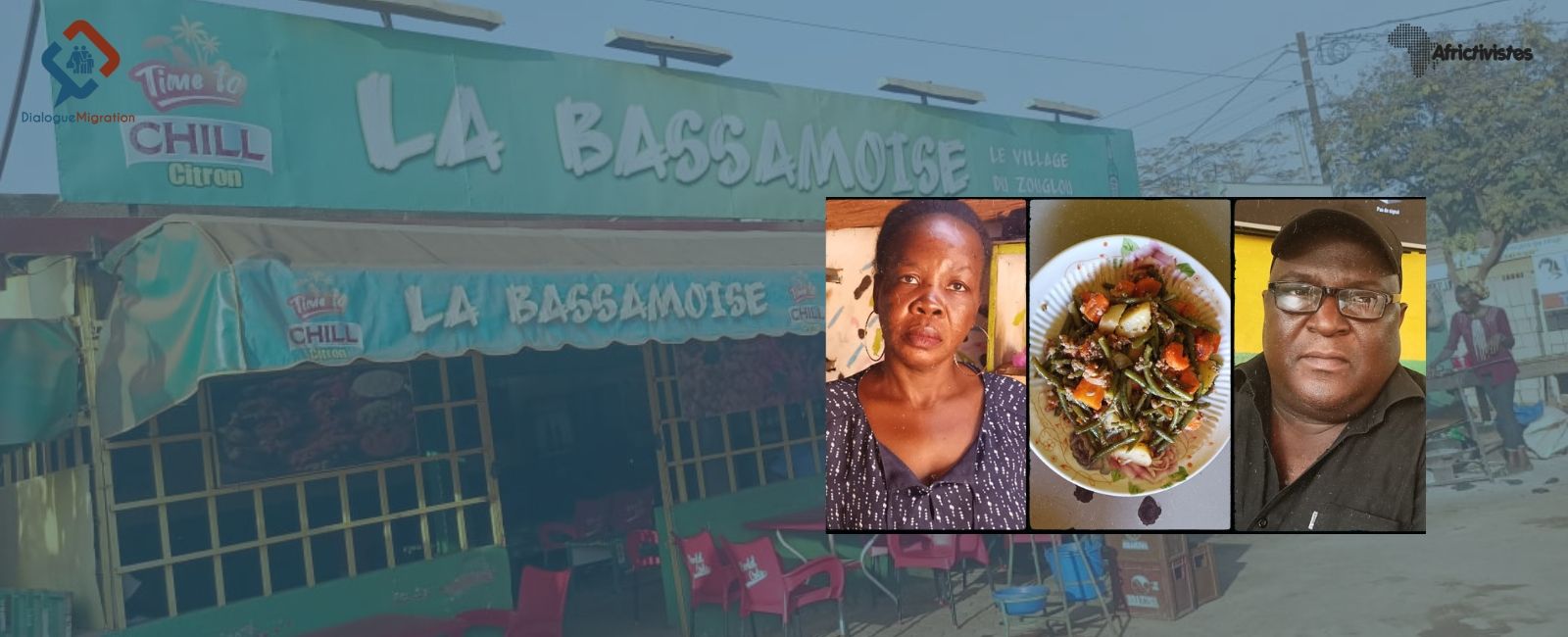

In Ouagadougou, many restaurants offer customers dishes as varied as they are appetizing. In this Burkinabe capital city, each community marks its presence through its gastronomy. Travel into this exotic gastronomic universe where “Le Restaurant Café Sahel” and “La Bassamoise”, respectively owned by the Chadian Valentine Dedolyeo and Désiré Kouadjo, of Ivorian nationality, have really taken their place.
An impetuous wind blows slightly on Le Restaurant Café Sahel on January 20, 2023. It is 2pm at Boulevard Tansonba, on the axis Pediatrics – SIAO (International Craft Fair of Ouagadougou). The day is sunny. The restaurant is well stocked. An ideal time to eat and drink in the Sahel. Some guests are seating under the hangar and others, on the terrace. Everyone tastes their dish. Valentine Dedolyeo and two of his employees, Marc and Biba, are busy satisfying customers. “Everyone comes to eat here,” Valentine says. There are “Chadians, Burkinabè, Ivorians, Nigeriens, Beninese, Togolese, Senegalese, Malians, Guineans, Central Africans, Westerners,… “, she makes the inventory.
The “boule” or the “to”, is the most popular dish because, in his opinion, “the African likes what is consistent that allows him to last all day,” adds the native of Logone Oriental, a region in southern Chad. In addition to the “boule” which costs 600 FCFA, the restaurant also offers dishes such as dumplings, casing or marara soups, shank, beef feet, grilled dishes … But his specialty is Kisar which is a very popular dish in Chad. Kisar is a kind of traditional pancakes made from rice flour mixed with sugar and salt. It is eaten with tomato sauce, fresh or dried okra, especially with sticky sauces. Added to these dishes, porridge, a “real fortifier”, according to the promoter.
What is the secret of the success of this restaurant? To this question, the Chadian, who has been in Burkina Faso for 15 years, answers with a smile: “It’s good food. I love cooking, so I do it with all the love I can get. In addition, I do not use flavors in the kitchen and other ingredients harmful to health. I cook in the simplest way with local ingredients such as soumbala (néré grain), garlic, onion … It is an organic restaurant. I also take into account people of the 3rd age by paying close attention to the amount of salt and oil used.” This activity is not only an opportunity, but allows the owner to pay for her education. “From 2013 to the present day, at least twenty employees of various nationalities have worked here,” she says. The Sahel is also charitable according to Valentine. “There are also people who make profit, especially students who do not have the means of subsistence who are often given a few dishes,” informs “maman Valentine”, as the students call her.
The graduate with a Bachelor degree in Accounting and Master 2 in Management Control Audit says she is well integrated in this West African part of the world. “I am more Burkinabe than Chadian,” she confesses and adds: “I feel comfortable.”
The one who dreams of having a Sahel Hotel everywhere in Africa arrived in Burkina Faso in 2008 as part of her university studies. In 2013, she decided to set up a restaurant called Le Logone, named after a river in Chad. The restaurant will be renamed Le Restaurant Café Sahel, a way to give an African dimension to the establishment.
What about the restaurant La Bassamoise?
Not far from the Café Sahel, is La Bassamoise, on Avenue Charles de Gaulle, a few meters away from the National Museum. It is with a broad smile that Désiré Kouadjo welcomes his customers in his restaurant that is full of people. A pleasant space where some customers find their account between attiéké with fish, plakali, foutou, snail meat, rice with seed sauce and okra, aloco, turkey legs and wings, wild meat without forgetting grilled meat. These dishes plunge us into Côte d’Ivoire.
It has been 24 years since Désiré Kouadjo set foot on Burkina Faso soil. Since then, he has married a Burkinabe woman.
In addition to Ivorians, La Bassamoise attracts the attention of Congolese, Beninese, Gabonese, Burkinabè, Cameroonians, Nigeriens, Chadians, Senegalese, Europeans,… This high attendance is linked, according to the promoter, to the quality of the dishes offered as well as the accessibility of prices. “Customers say the price of the meal is low. For example, the foutou dish costs 1250 FCFA. Here, the price is accessible unlike other restaurants where the same dish can cost 5000 FCFA or 10 000 FCFA “.
“Burkina Faso is my Europe”
Since its creation 5 years ago, La Bassamoise has kept the same affluence. For Désiré, a naturalized Burkinabè, the public appreciates cooking positively. “The food doesn’t stay. Everything is consumed during the same day,” he says. If he does not have the exact estimate of the number of dishes delivered during the day, it is nevertheless several kilograms of rice that are consumed per day: “We can prepare 6 bags of rice of 5 kilograms, or 30 kilograms every lunchtime”.
Désiré Kouadjo, the promoter of this gastronomic establishment that employs 15 people without counting the contractors, is a good communicator. A great adventurer, he took a tour of Mauritania before settling in Burkina Faso. “I am the symbol of African integration.” It was on his return from Chad that his wife proposed to him the idea of creating the restaurant. He believes that only the will and the desired objective guide an adventurer: “When you want to be an adventurer, you should not go because you know someone there. You have to go with your will and your goal”, while relativizing that happiness is not necessarily found in Europe. “I say it and I confirm it, the one who goes to Europe is not happier than me today. It is not Europe that gives happiness but it is how you think, how you want to lead your life that counts. In any case, Burkina Faso is my Europe, “adds the native of Grand Bassam who has lived for 24 years in the country of honest men where he married a Burkinabe woman.






